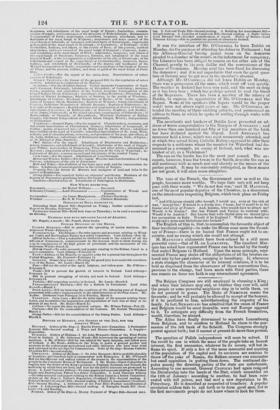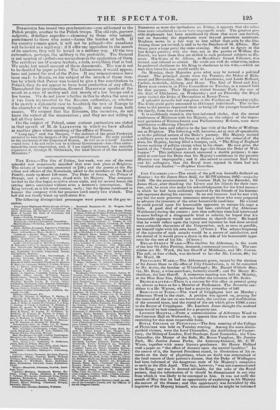The question of Polish independence will soon be solved. If
the revolt be one in which the mass of the people take an honest interest, the first encounter, whatever be its issues, will but in- flame its spirit. If only a few of the more mercurial and aspiring of the population of the capital and its environs are anxious to throw off the yoke of Russia, the Balkan-crosser can encounter but small opposition in putting them down. The continued dis- putes among the directing parties of the state are unfortunate. According to one account, General CLOPICKI had again resigaed the Dictatorship into the hands of the Diet, which assembled on the 19th of January : according to another, he had been rein- vested with full power, and had sent a new deputation to St. Petersburg. He is described as suspected of treachery. A popular revolution seldom fails to call forth or to form great men, but in the first movements people do not know whereto look for them. DIEBITSCH has issued two proclamations—one addressed to the Polish people, another to the Polish troops. The, old rule,paitere, subjectis, debellare superbis— clemency to those who sithinit, punishment to those who resist—forms the burden of both. If the country remain quiet, it will not be pillaged—the exactions will be levied in a legal way : if it offer any opposition to the march of its masters, they will be levied in a military way. Of the two extremities, perhaps, the military is the preferable. The General is not sparing of epithets nor scrupulous in the application of them. The revolters are of course traitors, rebels, everything that is bad. We make but small account of these documents. The War is not to be decided by paper pellets. The Lithuanians, it would appear, have not joined the rest of the Poles. If any remonstrances have been made to Russia, on the subject of the breach of those trea- ties by which that Power was bound to give a free constitution to Poland, they do not appear to have been productive of any effect. Throughout the proclamation, General D1EBITSCH speaks of the revolt as a case of mutiny and riot merely of a few troops and a few towns. lVe do not know whether in this he states the case as it has been ref.resented to the Russian authorities, or whether it be merely a diplomatic ruse to hoodwink the rest of Europe to the character of the ensuing struggle. It may arise from both causes. We suspect that the Russians, like ourselves, do not know the extent of the insurrection ; and they are not willing to tell all they know.
On the subject of Poland, some curious particulars are stated in that speech of M. de LAFAYETTE to which we have alluded in another place when speaking of the affairs of France.
"Long ago," said the Marquis, " the instinct of the great Frederick revealed to him the dangers of the partition of Poland. He only yielded to the instances of the Empress of Russia. He told mess himself. Austria —and here 1 do not refer you to a liberal Government—has often enter- tained the same iinpression, and, if I aria rightly informed, has recently expressed it, through M. Metternich, the least liberal of all the Austrian Ministers."



























 Previous page
Previous page